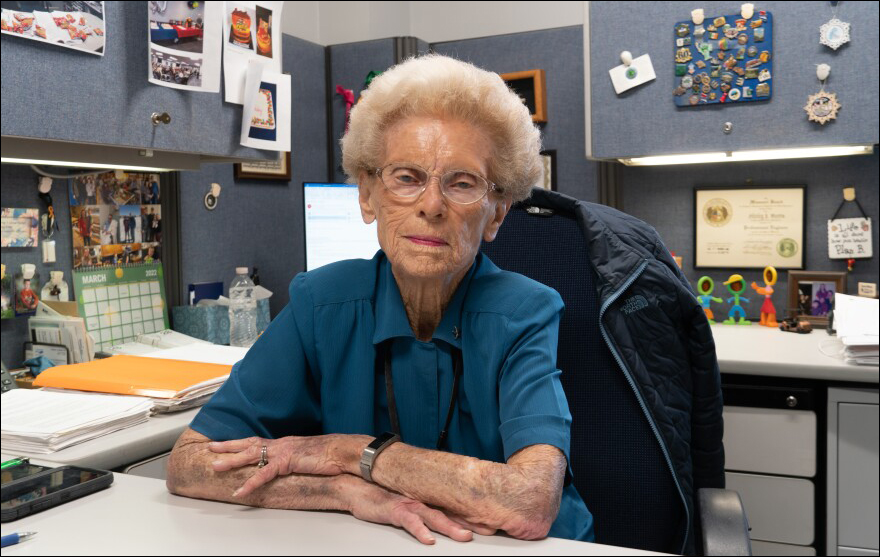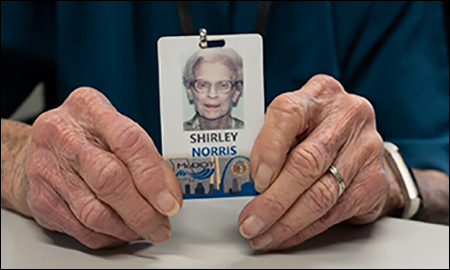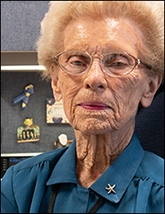
Editor’s note: This article is a compilation of an interview with Vanderbilt Engineering Communications and an NPR story by Kayla Drake, parts of which are republished with permission, that aired March 4, 2022, on St. Louis on the Air, KWMU St. Louis Public Radio.
The Missouri Department of Transportation took a chance on Shirley Norris 45 years ago and she has no plans to leave her job as a transportation project manager. That makes her the oldest full-time government employee in Missouri.
Currently, Norris, BS’51, is slated to manage 46 projects in Jefferson and Franklin counties between 2023 and 2027, totaling more than $190 million. Her goal is to continue working at least two more years. That way she can hit another milestone: spending half her life at MoDOT.
Norris says working 40 hours a week, and often more, suits her. “It ain’t broke,” she said on St. Louis on the Air. “So, I’m not trying to fix it. If I couldn’t work, I would be walking up one wall and down the other,” she said.

At this point in her 45-year career at MoDOT, she’s trained many of her bosses. When a technology issue arises, she sometimes mentions to the younger ones that she used a slide rule in college. “They don’t know what I’m talking about,” she said and laughed. She’s straightforward, passionate about her work, and fueled by “Cheetos, cookies and coffee.” She rarely arrives at work after 6:30 a.m.
“I’m hooked on Cheetos,” she said. “And [coworkers] bring me Cheetos, bless their hearts, on regular occasions.”
Norris takes her job seriously. If her health did start to fail, she would have no problem passing the baton and retiring. She said she’s instructed her bosses to be direct with her if she can no longer handle the work. “I’m paid with taxpayers’ money,” she said. “If I’m not producing, somebody needs to tell me so.”
From south St. Louis to Nashville
Originally from south St. Louis, Norris was one of the first female engineering students at Vanderbilt. Her dad, who managed a salvage yard, was intent on his only child getting the education he lacked. He paid her college tuition and became one of her biggest supporters.
“My father was very successful, and he was passionate about his own work,” Norris said. He traveled the South buying scrap iron and had a branch office in Nashville. Norris and her mother often traveled with him in the summer. Liking math and science and ignoring the advice of her high school teachers to reconsider a major in engineering, she applied to the Missouri School of Mines and Metallurgy in Rolla, now the Missouri University of Science and Technology, Northwestern, and Vanderbilt.
“A Nashville family my father knew through his business had a daughter my age. She took me on a tour of Vanderbilt’s campus, and I fell in love with it.” Norris said she can’t be certain but she thinks some support from Dean of Women Nora Chaffin may have assured her Vanderbilt offer.
Norris entered Vanderbilt in 1947, one of three female students in engineering. One left before graduating; one earned a degree in chemical engineering, and Shirley left Vanderbilt in 1951 with a degree in civil engineering.
At Vanderbilt, she joined AOPi sorority and lived in its house on West End Avenue with 14 girls and a housemother. “My room was the sunporch with an exterior staircase. When I worked on team projects, male students could visit my room to study and work as a group, but I had to keep all doors open.”
She made friends easily. It was a time when engineering was full of men entering or returning to school after WWII. “Those men were older, most were married, and I had so many protectors. If I got some dirty looks from anyone, it usually didn’t happen again.”
The School of Engineering’s tradition of students’ working collaboratively to learn and develop as they share ideas and experiences has served Norris well. “All our work was teamwork. That training was invaluable when I entered the job market. I believe I got a quality education at Vanderbilt,” she said.
But it was 30 years before Norris became a full-time engineer.
After graduation, she married Nashville native Walter Lovell, who had returned to Nashville after serving in the Navy. They met when Walter entered Vanderbilt to work on a master’s degree in chemical engineering. At first, Shirley was a stay-at-home mom and learned how to ride horses from ranchers while living in Colorado, where they had moved for Walter’s job at Union Carbide.
When Walter Lovell was killed by a drunk driver in the 1970s, Shirley suddenly became a single mother to Cheryl and young Walter. For a while she was fine financially, which she credits to her husband’s many insurance policies. She remarried and had her daughter Betty.
Walter left for college at Rolla and graduated with a degree in civil engineering in 1976. Cheryl graduated from Vanderbilt with a degree in civil engineering in 1978. Betty is a physician’s assistant. “She was around too many engineers,” Norris said and chuckles. “And, she loves her job.”
After her kids left for college, she wanted to work—and needed the money. After some private firms rejected her résumé because it had been too long since she’d left school, she said MoDOT took a chance and hired her.

“I’ve never forgotten that,” she said. “I’ve always been grateful to them. They gave me a chance. They were patient with me. And, I discovered I had a passion for doing the job.”
Every day Norris wears a starfish pin to work. It’s from a story that reminds her that a difference was made in her life, and she can make a difference in someone else’s life—one beached and then released starfish at a time.
“If you don’t see this pin on me,” she said, “I’ve forgotten it. But I keep one at the office just in case.”
Contact: Brenda Ellis, 615 343-6314
brenda.ellis@vanderbilt.edu